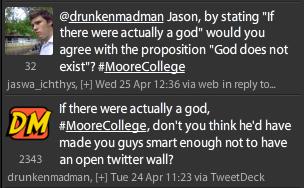I've been doing this "arguing with godbots online" thing for some time now, probably as long as I've had a reliable internet connection, yet some things never change.
First, some background. This week, word got around that Moore College, a cult consolidation center here in Sydney, had an open twitter wall. And as we all know, open twitter wall means TROLLIN' TROLLIN' TROLLIN'.
Soon, atheist quotations and provocative tweets were flowing onto the #MooreCollege hashtag, in the sure and certain hope that they'd make it onto the tweet wall and cause either some annoyance (blackhat trolling) or cause someone to genuinely question their beliefs (whitehat trolling).
As it turns out, the tweetwall was pre-screened so very few, if any, tweets got through. But I did recieve this reply in response to one of my tweets.

Oh dear.
That's a seriously telegraphed punch. I can see what's coming a mile off, and if you've ever argued with theists online, you probably can too. But let's examine the possiblities, shall we?
First of all, it's plainly evident from the twitter name that young Jaswa_ichtys is a theist, of the man-on-a-stick variety. Still, checking his profile reveals his twitter bio:
Jesus is tops and so is studying mathematics =]
So it's evident that what he's looking for here is a chance to stretch the powerful philosophical muscles he's built up pumping paper in bible study, allied to the mad skills in proofs and logic that he's gained in maths class. Essentially, he wants me to reply "yes, I assert that there's no god" for a couple of possible reasons (there may, of course, be others).
Possibility 1.
Once I've replied in the affirmative, Jaswa_icthys will proceed to regale me with "evidence" which will clearly make the assertion incorrect, probably topped off with "explain that, ATHEIST!"
Possibility 2:
More likely, Jaswa_icthys has heard the statement "it is impossible to definitively prove a negative" batted around at some point, and is waiting to spring that one, probably coupled with some "so you see, you have just as much faith as we do" McGrathian nonsense. He's been led into this by the juxtaposition of the firm, solid and reliable Logic of mathematics and the pretend, round-cornered, safety-scissors 'logic' of theology.
sigh
I, of course, do not play this game. While it is true that I often use the phrase "there is no god", I am of course aware of the weaknesses of such language with respect to epistemological claims. I am also aware of the principles of negative proof. While I may say "there is no god", I certainly cannot definitively, logically, prove it, any more than Jaswa_icthys can definitively prove, in line with the precepts of his cult, that there's no Thor*.
Or can I?
Well, that's the thing, isn't it? There are lots of things we know don't exist. Take, for instance, the luminiferous ether.
The ether was once the leading and most probable hypothesis for how light could be transmitted through a vacuum. To all intents and purposes, the ether was considered true by many authorities right up until the early 20th century, when Einstein's relativity put a final nail in its coffin by not only showing that it was not required, but by dispensing with ether's last major property, its immobility. The corpse continued to make audible noises through the lid, however, as Lorentz and others tried to square relativity with etheric hypotheses, but at the advent of modern physics, the ether was dead, and one may say, conversationally if not axiomatically, that the ether does not exist.
Whither, then, the god hypothesis? Can we dispense with that in a similar manner to ether?
Of course we can, but we need to be extremely careful over how we define "god". The thing that allowed physics to kill off the ether hypothesis was the fact that ether was well defined in terms of its observable properties. Once careful observation and calculation demonstrated that these properties were non-existent, uneccessary or untrue, ether went the way of all flesh.
Of course, theists constantly refuse to define their god in any more than vague, fluffy terms. Whereas the ether was an edifice at which science could level a punch, "god" claims are just so much fine mist.
Not unlike the ether itself, really.
This is what makes theology a pretend subject. It has nothing to study and refuses to demonstrate that what it studies actually exists before pronouncing on it. It is, in modern terms, etherology.
So I prefer to respond to Jaswa_icthys's question in this manner:
While I may state, conversationally, that "god does not exist", the real evidence for its non-existence comes in the failure of theism to demonstrate its claims with good, reasonable data. Bleat all you like, but in consistently failing to demonstrate your god's existence, you're the one showing that it doesn't exist.
That's right. Bigfoot hunters may continue to assert that Bigfoot is real, but until they bring some concrete evidence to the table, we are not unjustified in saying "bigfoot does not exist". Likewise ghosts, the Loch Ness monster, alien abductions, effects of homeopathy and John fucking Edward.
And don't try barnyard-grade rhetorical tricks on me. I don't play along**
* Thor is, of course, real. Praise Thor.
** unless I'm in the mood to do it for the lulz. This rule covers everything.
posted @ Thursday, April 26, 2012 11:43 AM